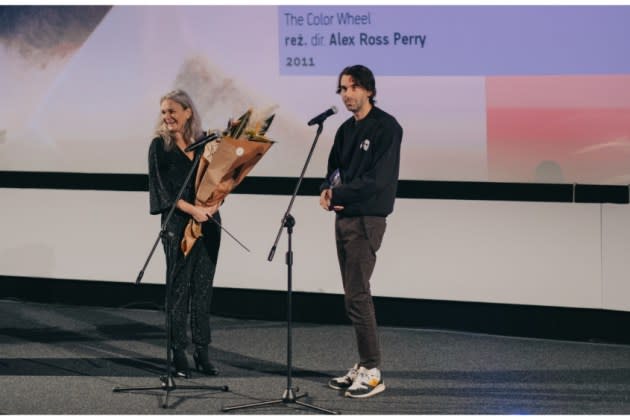‘Her Smell’ Director Alex Ross Perry Talks Nonfiction Projects About Video Stores, Indie Rock Band Pavement: ‘They Are Examinations of the Unexamined Era’

“Her Smell” director Alex Ross Perry is developing two nonfiction projects, including the as-yet-untitled doc about video stores.
“I can’t speak for everybody but yeah, I miss them,” he tells Variety at Poland’s American Film Festival, where he also picked the Indie Star Award and treated the audience to work-in-progress footage.
More from Variety
“I’m trying to tell this story while it’s still within our grasp. You only have so much time when something is both a present tense memory for one half of your audience and a completely new experience for another. In another decade, everything I’m talking about will be ancient history.”
Perry, who has been working on the project for 10 years, is also putting finishing touches on “Pavements,” about an indie rock band.
“I think both this video store movie and the Pavement movie are examinations of the unexamined era,” he says.
“It was something I was thinking about when I made ‘Her Smell.’ We haven’t started narrativizing the 90s yet. We haven’t really delved into that era and asked what it was and what it meant, but it’s my time. No one who is older can tell that story and no one who is younger can tell that story.”
In both projects, he will explore “the purity of that period.”
“These projects attempt to go back to a time when things really mattered. Album sales don’t matter to musicians the way that they used to. Movies don’t matter to people the way they used to. Right now, it’s just ‘content’,” he notes.
“Putting your hard-earned money on the counter to buy a CD created a relationship between you and that music that doesn’t exist at all anymore, unless you are a record collector.”
Still, in “Slanted!” he will go one step further.
“We get 1,000 music docs a year and sometimes, that’s what bands want. They want to protect and polish their legacy as they make a companion piece to their body of work. That’s the opposite of what Pavement wanted,” he notes.
“I’m a junkie for music documentaries and I watch them too, but my whole question was: ‘Why not do something else?’ My current lack of interest in linear thinking led me to ‘maximalist’ storytelling.”
In the film, set to be finished “at some point” next year, he will combine reality and fiction.
“Stephen [Malkmus, vocals and guitar] has allowed me to make a documentary about things that only happened because I created them. It’s a doc about scripted events I fabricated, playing out whether the participants in the room know that or not. We had cameras around the room, rolling, and all the actors were in character the entire time – not as band members but as actors playing band members,” he enthuses.
“To me, it feels like a new kind of movie. I have never seen anything like this, ever.”
Despite his acclaimed collabs with Elisabeth Moss, also on “Listen up Philip” and “Queen of Earth,” Perry is not planning to go back to fiction anytime soon.
“I just don’t get why people who supposedly like making movies only care about one mode of production. Scorsese has almost made more documentaries than narratives at this point. This kind of unbridled creativity it’s not common enough and I don’t understand why people want to rip off his aesthetic and not his work ethos,” he says.
“When you get to work in nonfiction, the longer you go on, the more the world writes your story. You can edit a documentary one day a week and it’s always simmering just a little, or you can say: ‘I haven’t produced one minute of filmed content in years because I can’t get money.’ That makes no sense to me.”
He would like other filmmakers to “stretch their legs and participate in parallel forms of creation,” he observes. Just like writers.
“When you look at authors like David Foster Wallace, he wrote novels, short fiction stories or nonfiction. That’s how filmmaking should be as well,” he insists.
“There’s nothing riding on [these two films]. There’s no urgency, which to me is the rarest thing in any form of filmmaking and possibly the greatest one too. In that sense, it becomes like writing a book.”
“On the one hand, I want to be positive because it’s really nourishing for my brain. On the other, I have only arrived at this conclusion because of the dire state of narrative film in the U.S.”
Best of Variety
Sign up for Variety’s Newsletter. For the latest news, follow us on Facebook, Twitter, and Instagram.

